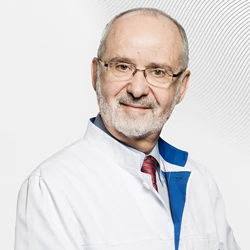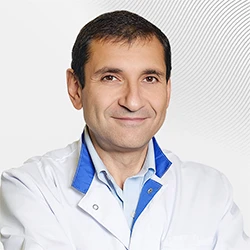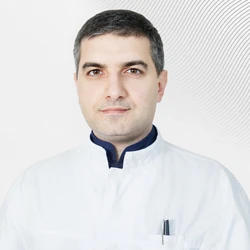Gastric bypass surgery is a bariatric surgery for the correction of obesity, which is indicated for patients with a body mass index (BMI) ≥ 35 kg/m2. In the European Medical Center, bypass surgery is performed by experienced surgeons using robotic equipment. We practice an integrated approach — a psychologist, an endocrinologist, and a nutritionist work with each patient. This allows you to achieve weight loss and maintain the achieved result.
The essence of the methodology
The essence of gastric bypass surgery is to reduce the volume of the stomach and simultaneously turn off the intestinal tract from the digestive system. As a result of the combination of the two mechanisms of action, maximum weight loss results are achieved. Weight loss occurs naturally due to a calorie deficit, the result is consistently maintained while following the recommendations of doctors.
To reduce the stomach, a narrow tube with a volume of 30-50 ml is formed in its upper part. A decrease in the volume of the stomach leads to the fact that saturation occurs faster, the feeling of hunger is less bothered.
During gastric bypass surgery, the anatomy of the intestine changes — the duodenum, in which the main part of fats is absorbed, and a significant part of the small intestine are excluded from the digestive process. To promote food, the small intestine connects to the upper part of the stomach.
Gastric bypass surgery preserves the circulation of digestive juices and bile, but the path of passage of food changes. The juices involved in digestion and assimilation combine with food in the second half of the small intestine. This leads to malabsorption, a violation of the absorption of nutrients in the gastrointestinal tract. The process of assimilation of energy from the eaten food becomes more difficult, and the number of calories received decreases accordingly.
Therefore, patients need vitamin and mineral complexes and the supervision of specialists.
Gastric bypass surgery is reversible, and the natural digestive mechanism can be restored later.
Operation efficiency
To date, gastric bypass surgery provides the best results for grade III-IV obesity, when other bariatric operations are not as effective. In the first year after bypass surgery, patients lose up to 70% of their excess weight, which leads to correction of metabolic disorders and remission of type II diabetes in 95-99% of cases.
The high efficiency of the procedure is due to a combination of reduced digestive passage, pronounced malabsorption, stimulation of insulin production in response to food intake and increased insulin sensitivity.
Bariatric intervention quickly puts the body in a state of energy balance, which contributes to the long-term restoration of metabolic processes and remission of many complications of obesity.
Indications
Indications are morbid obesity with a BMI ≥ 35 kg/m2 and pathologies developing against the background of obesity:
-
type II diabetes mellitus;
-
non-alcoholic fatty liver disease;
-
hypertension and cardiovascular diseases;
-
sleep apnea;
-
joint lesions;
-
reproductive disorders in women and men.
In each case, the decision on the need for the procedure is made after a comprehensive examination.
Contraindications
Contraindications include general contraindications for surgical intervention:
-
the period of exacerbation of chronic diseases;
-
acute infectious processes;
-
undergoing cancer treatment;
-
pregnancy and breastfeeding.
When evaluating possible contraindications to surgery, the psychological status of the patient, his ability and desire to follow the recommended diet and diet are taken into account.
Preparation
Before the operation, the patient undergoes an examination, which includes:
-
blood and urine tests;
-
ECG, fluorography;
-
examination of the stomach and intestines.
Consultations with a gastroenterologist, nutritionist, endocrinologist, and psychologist are also conducted. If necessary, specialists from other fields are involved in the diagnosis.
How the operation is performed
The operation is performed laparoscopically under general anesthesia — access to the stomach is carried out through 4 small incisions in the abdomen. The EMC uses modern Da Vinci Si HD robotic equipment, the use of which makes it possible to increase the accuracy of manipulations, reduce the risks of postoperative bleeding and the development of infections.
The duration of the operation is 1.5 – 2 hours. After bypass surgery, the patient is moved to the postoperative ward, where he wakes up from anesthesia.
When the condition is stabilized, the patient is transferred to a hospital, where the stay is 2-4 days.
Postoperative period
Postoperative rehabilitation begins immediately upon transfer to the hospital. To prevent pulmonary and metabolic complications, we help our patients get up and walk on the day of surgery.
The first day after the intervention, it is allowed to drink water in small portions. For the next three weeks, only liquid homogenized food is allowed. Further, under medical supervision, the menu is expanded, the use of solid food is possible no earlier than in two months.
The key role in the effectiveness of the procedure is played by the patient's compliance with the recommendations of doctors, especially diet and nutrition. It is necessary to adhere to a diet developed by a nutritionist, eat in small portions, chew food thoroughly, and avoid foods that are too sweet and fatty.
If you do not follow the recommendations, complications may develop related to intestinal obstruction, damage to stomach tissues, dumping syndrome, in which neurovegetative disorders and hemodynamic disorders appear.
Exceeding the recommended serving size can lead to stomach distension and subsequent weight gain.
To avoid unpleasant consequences and achieve normalization of weight with stable preservation of the result, you need to tune in to productive interaction with doctors and the fulfillment of their prescriptions.
Literature
-
Oral Bazarbaevich Ospanov, Galymzhan Almasbekovich Eleov, & Farida Kairatovna Bekmurzinova (2020). Gastric bypass surgery in modern bariatric surgery. Obesity and metabolism, 17 (2), 130-137.
-
Glinnik A.A., Avlas S.D., Stebunov S.S., Rummo O.O., & Germanovich V.I. (2021). Bariatric surgery for morbid obesity. Surgery News, 29 (6), 662-670.
-
Galagudza M. M., Neymark A. E., Kornyushin O. V. Metabolic surgery: from history to real achievements. Experimental and clinical gastroenterology. 2022;198(2): 86–102. DOI: 10.31146/1682-8658-ecg-198-2-86-102
-
Anokhina V.M., Bordan N.S., Yashkov Yu.I., Orlova A.S. Features of carbohydrate metabolism in the surgical treatment of morbid obesity and type 2 diabetes mellitus using various modifications of biliopancreatic bypass surgery with longitudinal gastric resection // Diabetes mellitus. 2022. №4.
Questions and answers





















.webp)

.webp)





